| Botanical Name |
|
| Family |
Aloeaceae - The aloe family. |
| Pronunciation |
|
| Common Name(s) |
|
| Plant Group |
- Succulent A plant having fleshy stems or leaves often adapted to dry conditions.
|
| Plant Size |
- Medium
| Tree | 10m to 16m |
| Shrub | 1m to 2m |
| Perennial/ground cover | 40cm to 60cm |
| Bulb | 40cm to 60cm |
| Succulent | 40cm to 60cm |
|
| Position |
- Partial Shade The area is in shade for part of the day and in full sun for part of the day.
- Sun The area is in full sun for all or most of the day, all year round.
|
| General Information |
- Drought Tolerance: High The plant is well adapted to arid conditions; it can survive long periods of drought and high temperatures without extra water.
- Evergreen Plants that have leaves all year round.
- Frost: Half-hardy The plant is able to survive low temperatures and some frost but requires protection against severe frost.
- Salt spray tolerant A plant with specific adaptations enabling it to grow in a saline environment.
- Sand tolerant Plants adapted to survive in nutrient poor, very sandy soils.
- Thorns / Spines / Prickles Thorn: A hard, woody, pointed branchlet.
Spine: A modified leaf forming a hard, sharp-pointed outgrowth.
Prickle: A small, sharp-pointed outgrowth growing from the bark of the plant.
- Water Wise Plant species originating from low rainfall regions that require less water to survive and thrive than other plant species.
- Wind Tolerant Plants able to withstand the effect of strong winds.
|
| Specific Information |
A rewarding, easy to grow subject, this hybrid of Aloe arborescens is decorative, has attractive grey-green foliage and large, eye-catching flowers. This is a multi-stemmed aloe with strongly recurved leaves, usually edged with firm, pale or grey-green teeth. One to several flower spikes rise from each plant. It has the appearance and growth habit of Aloe Arborescens and while the plant is much smaller, the flower remains large. I have no idea which aloe was crossed with Arborescens to create this hybrid.
|
| Ad Break |
|
| Flowers |
| Description |
tubular blooms in a conical head on unbranched spikes
|
| Season |
- Autumn to Winter Plants will seldom bloom for the entire season as given in the list, but should flower during a period within these parameters.
|
| Colour |
|
| Growth Rate |
- Moderate to Fast Specifying growth rate can be very misleading as there is considerable variation of growth rate depending on type and species of plant, available water, supplementary feeding, mulching and general care, as well as the plants suitability and adaptability to the garden environment.
|
| Plant Uses |
- Accent or Focal Point A plant used to attract the attention because of its colour or form.
- Attracts bees, butterflies or other insects This plant attracts insects which can be food for birds or other creatures in your garden.
- Attracts Birds This plant will attract birds.
- Border A strip of ground, at the edge of a driveway or path in which ornamental plants or shrubs are planted.
- Container Trees, shrubs and ornamental species that can adapt to growing in a restricted environment.
- Filler Either a fast growing tree or shrub used temporarily to fill in an area while the permanent plants grow to a desired size, or a plant used to fill gaps in borders or beds.
- Pioneer for new gardens A very fast growing plant, able to withstand hardship, that can be used to populate land that has recently been cleared of natural vegetation. These plants pave the way for slower-growing species by adding nutrients to the soil and creating leaf litter.
- Rock Garden An area constructed of larger rocks, arranged naturally, to emphasise the use of stones as a main element. Generally plants used do not need a lot of care.
- Suitable for coastal gardens Plants adapted to dry, sandy soil, forceful wind, limited rainfall and intense sunlight.
- Suitable for smaller gardens Such plants do not have invasive root systems, remain small or controllable and can often be grown in containers.
- Wild Garden An indigenous garden planted for the benefit of wildlife and birds. Provides food, water, a variety of mini-biomes and no poisonous chemicals are used.
|
| Distribution and Habitat |
|
| Planting Suggestions |
Aloe arborescens hybrids grow best in well-drained, compost-enriched soil. Once established they will seldom require attention. To propagate from a branch or off-shoot, allow the cut to dry for a week then plant in well-drained soil or sand or directly into their permanent place in the garden. Don't over-water the cuttings as they may rot.
|
| Medicinal Uses |
|
| Ad Break |
|


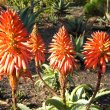
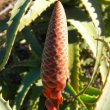
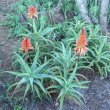
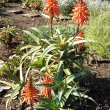
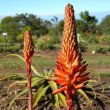


Discuss this plant
Share knowledge, ask a question or give an experience.